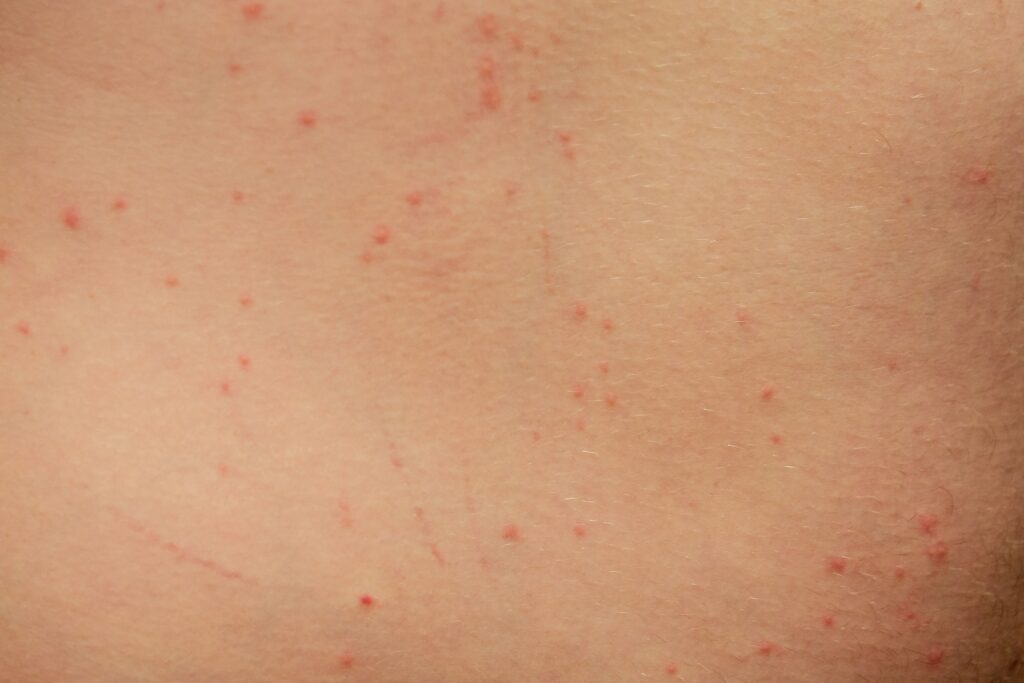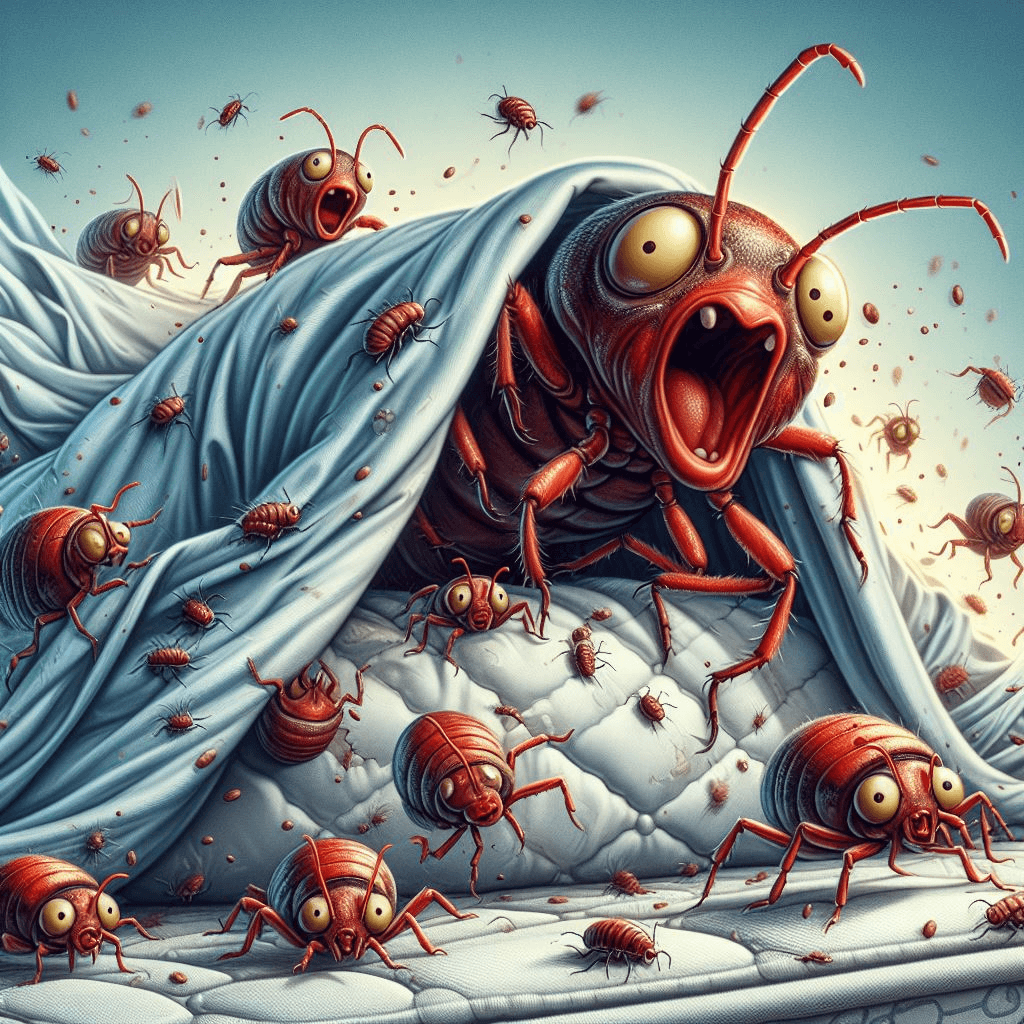A Miniature Nightmare: Understanding Bed Bugs
Imagine a tiny, blood-sucking creature that hides in the darkest corners of your dorm room, just waiting for the perfect moment to feast upon your unsuspecting flesh. That’s the eerie reality of college bed bugs. These pesky insects are notorious for causing sleepless nights and itchy bumps.
But what exactly are bed bugs? Bed bugs, scientifically known as Cimex lectularius, are small, flat insects that belong to the family Cimicidae.
Despite their minuscule size (a mere 4-5 mm in length), they can wreak havoc on your peace of mind. These nocturnal creatures possess a remarkable ability to survive and thrive by feeding on human blood.
Embrace a Bed Bug-Free Lifestyle: Regain peace and tranquility in your home by mastering bed bug control and prevention. Explore our article, Mastering the Art of Bed Bug Eradication, and learn the essential techniques for a bed bug-free environment.
Beguiled by Dormitories: Why College Living Spaces Attract Bed Bugs
College campuses are notorious breeding grounds for bed bug infestations. So why do these bloodthirsty critters seem to have a special affinity for college dorms, residence halls and shared living spaces? Firstly, consider the sheer number of students residing near these bustling hives of academia.
As eager students pour into dormitories at the beginning of each school year, they unknowingly bring along potential hitchhikers—bed bugs from their previous encounters with these pests at home or during travels. Furthermore, college dorms provide an ideal environment for bed bugs to thrive unnoticed.
The constant influx and movement of people create ample opportunities for these stealthy creatures to spread disease between rooms through shared furniture or personal belongings. Many college dorms feature ancient mattress treasures that have been passed down from one generation to another (or so it seems!).
These worn-out mattresses often harbor hidden colonies of bed bugs, inviting these unwanted guests into unsuspecting students’ lives. So, with an understanding of what bed bugs are and why they seem to have a penchant for college dorms, it becomes clear that effective prevention strategies are crucial.
In the next sections, we will dive deeper into specific measures that can help protect your living space from these relentless invaders. Stay tuned!
The Mysterious World of Bed Bugs
Their Elusive Appearance and Size
When it comes to bed bugs, appearances can be deceptive. These tiny creatures measure only about the size of an apple seed, making them masters of disguise.
With a flat oval body and a reddish-brown color, they effortlessly blend into the dark crevices and cracks around your bed frame, dorm room or shared living space. The adult bed bugs have a distinct six-legged shape, while the younger nymphs are almost translucent.
Feeding on Human Blood: A Vampire’s Delight

Did you know that bed bugs are like miniature vampires in search of their next meal? Well, maybe not as glamorous as those portrayed in books and movies, but equally bloodthirsty. These nocturnal pests are attracted to our body heat and exhaled carbon dioxide, which leads them straight to our cozy beds in college dorm rooms.
While we sleep soundly, they stealthily crawl onto our exposed skin and use their piercing mouthparts to extract our blood for nourishment. Don’t worry; they don’t transmit diseases like mosquitoes do – their bites are simply irritating and itchy.
Hiding Spots and Their Remarkable Travel Abilities
Bed bugs may lack wings, but that doesn’t stop them from embarking on incredible journeys. They can crawl surprisingly fast across various surfaces such as bedding, clothing, furniture, or even walls.
Though they prefer staying close to their food source (i.e., humans), these agile critters can travel long distances within buildings if necessary – hitching rides on backpacks or used furniture brought into your dorm room. As for hiding spots, bed bugs excel at finding inconspicuous nooks and crannies where they feel safe during daylight hours.
You might find them lurking behind loose wallpaper, inside electrical outlets, or beneath the mattress seams. They’re also known to take shelter in cracks within bed frames, headboards, and baseboards.
So, if you suspect a bed bug infestation, be sure to fully inspect these areas for signs of their presence. Remember, understanding the behavior of these elusive pests is crucial in combating them effectively and preventing an infestation from taking hold in your college dorm or shared living space.
Signs of a Bed Bug Infestation

Identifying the Unwanted Guests: Itchy Bites and Red Welts
Ah, the notorious bed bug bites – those pesky reminders that these tiny bloodsuckers have made themselves at home. One of the most common signs of a bed bug infestation is waking up with itchy bites or red welts on your skin. However, it’s essential to note that not everyone reacts to their bites in the same way.
While some individuals may experience severe itching and visible welts, others may not react at all. So, how can you be sure if it’s indeed a bed bug bite?
Look out for clusters or straight lines of red, inflamed bumps on exposed areas like arms, legs, or shoulders. Pay attention to any unusual itching patterns and consult a healthcare professional if necessary.
Unmasking the Clues: Blood Stains, Fecal Matter, and Discarded Exoskeletons
As nocturnal creatures feeding on human blood at night, bed bugs leave behind some telltale signs during their stay in your dorm or shared living space. Keep an eye out for small bloodstains on the floor, your sheets or pillowcases—resulting from accidental crushing of engorged bed bugs after they’re done feasting on your blood supply.
If you notice rusty-colored stains—similar to dried blood—on furniture or walls near your sleeping area, this could indicate an infestation too. Another distinctive sign is the presence of fecal matter resembling dark spots or smears on your mattress cover, sheets, or even nearby furniture like nightstands.
These tiny black marks are nothing but digested blood excretions left by our unwanted guests. Keep an eye out for discarded bed bug exoskeletons.
Similar to snakes shedding their skin as they grow larger, bed bugs also molt and leave their exoskeletons behind. These amber-colored, papery shells can often be found near the seams of your mattress or hidden in cracks and crevices around your sleeping area.
So, the bottom line – if you notice any combination of these signs – bites, blood stains, fecal matter, or exoskeletons – it’s time to roll up your sleeves and take action against these stealthy nuisances. Remember, detecting a bed bug infestation early on is crucial for swift and effective elimination.
Now that we’ve uncovered the signs to look out for let’s move on to discussing preventive measures that can help keep these uninvited guests at bay. (Inspired phrases: bedding, inspecting clothing folds, dark spots on sheets)
Prevention Measures for College Dorms and Shared Living Spaces
The Importance of Regular Cleaning and Decluttering to Eliminate Hiding Spots

Living in a college dorm or shared living space can be exciting, but it also poses some unique challenges, one of which is the potential for bed bug infestations. These pesky critters can quickly turn your cozy haven into a nightmare. However, by implementing some preventive measures, you can keep them at bay.
One essential step is maintaining cleanliness and decluttering regularly. Bed bugs are masters at finding hiding spots, often residing in cracks, crevices, or seams of mattresses, furniture, and even curtains.
By keeping your living space clean and clutter-free, you minimize these potential shelters where they can lay their eggs or find refuge during the day. Regular vacuuming of mattresses, furniture upholstery, carpets, and curtains is vital to remove any bed bugs that may be present and disrupt their infestation cycle.
Additionally, organizing your personal belongings effectively helps prevent bed bugs from spreading further. Clutter provides ample hiding spots for these pests to multiply rapidly.
Make use of storage solutions such as sealed plastic bags or re-packing items tightly in boxes to limit the available spaces where bed bugs could take up residence. Remember that a clean and organized living area not only reduces the risk of infestation but also promotes overall well-being.
Proper Laundry Practices to Prevent Bed Bug Spread

Laundry may seem mundane amidst college life’s hustle and bustle; however, it plays a crucial role in preventing bed bug infestations from spreading further within dorms or shared spaces. Bedding items such as sheets, pillowcases, and blankets should be washed regularly using high temperatures (preferably over 60°C) to kill any lurking bed bugs or their eggs. Similarly important is washing clothing items that have come into contact with bedding, especially if you suspect a bed bug problem.
Washing these items in hot water at high temperatures eliminates any potential hitchhikers. Additionally, drying them using high heat settings or exposing them to direct sunlight further ensures the elimination of any bed bugs that may have survived the wash.
Remember, bed bugs can latch on to clothing or fabric items and spread from the clothing frequently one space to another, so proper laundry practices go a long way in preventing their unwanted presence in your living quarters. By adopting these precautionary measures, you reduce the risk of bringing these unwanted pests along with your laundry.
Effective Use of Mattress Encasements as a Preventive Measure

When it comes to bed bug prevention for college dorms and shared living spaces, mattress encasements are a valuable tool in your arsenal. These encasements act as protective barriers around mattresses, limiting access for bed bugs and trapping them within if they are already present. Mattress encasements are designed to enclose the entire mattress securely, sealing off any potential hiding spots that bed bugs could exploit.
Ensure you choose encasements that are specifically designed for bed bug protection and not just regular mattress covers or protectors. The right type and size of encasement will provide an impenetrable barrier against pesky critters seeking a blood meal while you sleep.
Furthermore, mattress encasements make it easier to detect any early signs of infestation since the bugs get trapped within the protective covering. Regular inspections of the seams and surface for blood spots or discarded exoskeletons can help identify potential issues before they become full-blown infestations.
By investing in quality mattress encasements and regularly inspecting them for signs of infestation, you add an extra layer of protection against those unwelcome roommates that might be lurking in your dorm bed. Remember, college life should be about pursuing knowledge and creating lasting memories – not about battling bed bugs.
By incorporating these preventive measures into your daily routine, you can significantly reduce the risk of encountering these bothersome pests. Stay vigilant, maintain cleanliness, and promote a pest-free environment in your college dorm or shared living space.
Bed Bug Awareness in College Dorms and Shared Living Spaces
Importance of educating residents about bed bugs
In the battle against bed bug problems in college dorms and shared living spaces, education is an essential weapon. It is crucial to provide college students and residents with the knowledge needed to recognize signs of an infestation early on.
By understanding the behavior and habits of bed bugs, individuals can take proactive measures to prevent their spread. Education empowers residents to be vigilant and responsive, reducing the chances of bed bugs reaching epidemic proportions within a living space.
Discussion on raising awareness through workshops or informational sessions
One effective way to promote bed bug awareness among college students and residents is by organizing workshops or informational sessions. These events can be held at the beginning of each academic year or as needed throughout the year.
Experts in pest control can be invited to share valuable insights on identifying signs of infestation, prevention techniques, and proper response procedures. Interactive discussions and question-and-answer sessions allow students to engage actively in learning about bed bug prevention for college dorms and shared living spaces.
Tips for recognizing signs early on to prevent
Early detection plays a critical role in preventing the spread of bed bugs in college dorms and shared living spaces. Educating students about common indicators of bringing bed bugs, such as bites resembling small red welts on exposed skin areas can help them identify potential infestations promptly. Additionally, blood spots on bedding or clothes, discarded exoskeletons, or a sweet musty odor may signify a presence of these pests.
Encouraging regular inspections by both residents and maintenance staff will ensure that any sign is noticed early enough for necessary actions like contacting professional pest control services or reporting to college housing and authorities. While dealing with bed bugs in college dorms and shared living spaces may seem daunting at first, fostering bed bug awareness among residents is a crucial step toward prevention.
By educating college students about the signs, habits, and preventive measures associated with bed bugs, we empower them to take an active role in safeguarding their living environments. With increased awareness and timely action, we can minimize the spread of these expert hitchhikers and create spaces that are free from the challenges posed by bed bug infestations.
Choose D-Termination, Las Vegas’ top-notch pest control service, to conquer bed bugs!

If you’re grappling with bed bugs in Las Vegas, worry no more. D-Termination is here to provide assistance. Our team of experts specializes in eliminating bed bug infestations and restoring comfort to your living space. Bid farewell to bed bugs by selecting D-Termination for effective pest control today!
To book your bed bug control service and reclaim your space from these persistent pests, contact us at 702-919-6310 or visit dtermination.com.
Frequently Asked Questions:
Colleges typically employ various measures such as regular inspections, prompt treatment of infestations, education programs, and collaboration with pest control professionals to address bed bugs.
Bed bug infestations in college dorms can vary, but they are relatively common due to the high turnover of students and shared living spaces.
While dorm beds are not specifically designed to be bed bug-proof, some colleges may use bed bug-resistant mattress encasements or other preventive measures to minimize the risk of infestations.
There is a potential risk of getting bed bugs if your roommate has an infestation, as bed bugs can easily move between nearby spaces. It’s crucial to take preventive measures, such as regular inspections, reporting any signs of infestation, and maintaining cleanliness in your living area.
If you enjoyed reading this article, you might also find these related topics or articles worth exploring:
Unveiling the Art of Bed Bug Prevention: A Masterful Guide to Safeguard Your Home







